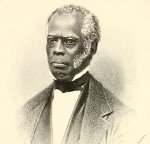
Embracing an account of his early life, the redemption by purchase of himself and family from slavery, and his banishment from the place of his birth for the crime of wearing a colored skin.
Lunsford Lane was born on the plantation of Sherwood Haywood in 1803. Since his parents, Edward and Clarissa, were house slaves for the Haywood family in Raleigh, Lunsford also became a servant for the family, providing him far more liberties than field slaves. The entreprenueral spirit came early to Lunsford when as a young child he sold a basket of peaches – earning his first money.
That business accumen took on a new furvor when as a young man he improved upon his fathers tobacco, creating a brand with a sweet and pleasant taste. The tobacco became popular with the local residents and soon his side business expanded into others selling his tobacco for a commission. All the time he ran this operation, he also worked as a house slave in the day, and performed other varied tasks, such as a handyman for hire, and messenger for the governor.
It took over 18 years for Lunsford to purchase his and his family’s freedom, but by 1842 he had accomplished the feat. The story of how he got to that point I’ll leave for him to tell you in his narrative…both tragic and poignant, yet victorious as well, the slave narrative of Lunsford Lane should be read by all.
Slave Narrative of Lunsford Lane TOC
- To The Reader
- Narrative
- Prostrated all my Hopes
- Petition to the Legislature
- Court Commenced it’s Session
- Joy Succeeding Sorrow
- Returned to My Family
- Court Pleas
Entered according to act of Congress, in the year 1842, by Lunsford Lane,
In the clerk’s office of the District Court of Massachusetts.
This site includes some historical materials that may imply negative stereotypes reflecting the culture or language of a particular period or place. These items are presented as part of the historical record and should not be interpreted to mean that the WebMasters in any way endorse the stereotypes implied .
